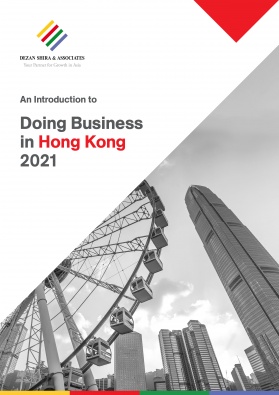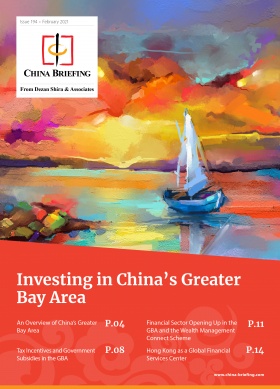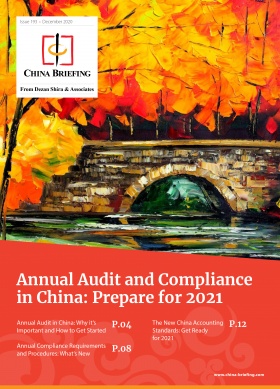Hong Kong Added to EU Watchlist on Non-Cooperative Tax Jurisdictions
Hong Kong was recently added to the EU’s grey list of non-cooperative tax jurisdictions due to concerns the city is enabling ‘double non-taxation‘ of passive income. In response, the Hong Kong government reiterated its commitment to make the requisite amendments to its tax law to comply with EU standards, a move that may have a limited impact upon some foreign enterprises in Hong Kong.
Hong Kong has been added to the EU’s so-called ‘grey list’ of non-cooperative tax jurisdictions in the latest edition of its regularly updated watchlist, released on October 5, 2021.
The document titled the Council conclusions on the revised EU list of non-cooperative jurisdictions for tax purposes lists Hong Kong under Annex II, which tracks “jurisdictions that do not yet comply with all international tax standards but have committed to reform”.
Hong Kong was included due to the “existence of harmful tax regimes” in the city. The document also states that Hong Kong, along with the other countries and regions included on the grey list, has “committed to amend or abolish [its] harmful foreign-source income exemption regimes”. Countries and regions included on the grey list have been given until December 31, 2022 to update their legislation.
Hong Kong was previously included on the watchlist in 2017 and 2018 but was subsequently removed in 2019 after making the requisite changes to its laws to improve its tax environment and increase financial transparency.
Hong Kong will have the opportunity to be removed in future amendments of the list – the next amendment is due for release in February 2022 – by updating its legislation to meet EU standards.
If Hong Kong does not update its legislation by the given deadline of December 31, 2022, it will be moved to the blacklist, or Annex I. Blacklisted countries and regions are subject to a number of defensive measures by the EU. This could result in denial of deductions of outgoing payments, subjection to controlled foreign corporation (CFC) rules (which prevent companies from moving profits to offshore structures), increased withholding taxes, and increased audits of taxpayers in the blacklisted region.
Why was Hong Kong re-added to the list?
Hong Kong currently charges no tax on capital gains, interest, or dividends, which is considered ‘passive income’. This rule is part of what makes the city an attractive base for foreign companies that want to expand into regional markets, as it enables them to reduce their corporate income tax (CIT) obligations by funneling profit and revenue generated from sources such as royalties or interest in other markets through Hong Kong.
Hong Kong also does not charge tax on profits or revenue that is earned offshore. This is known as the ‘territorial source principle of taxation’. Although this activity is not technically illegal, it flies in the face of international efforts to curb the ‘race to the bottom’ wherein different regions and countries around the world compete to attract businesses by lowering tax obligations.
However, the inclusion of Hong Kong on the grey list this time does not take into consideration the CIT exemption of active revenue generated offshore. Instead, it focuses on the issue of taxation of passive income.
The EU included Hong Kong in the latest list because of concerns that the city is enabling ‘double non-taxation’ of passive income, wherein companies are exempt from paying tax on income derived from offshore passive sources in both the country or region where it is generated and in Hong Kong, where the company is registered and declares its profits.
How will Hong Kong’s tax law change?
In a press release issued on the same day of the list’s publishing, the Hong Kong government said that it “agrees to cooperate with and has committed to the EU to amend the Inland Revenue Ordinance (Chapter 112 of the Hong Kong laws) by the end of 2022 and implement relevant measures in 2023”. The Inland Revenue Ordinance is Hong Kong’s primary tax law.
According to the Guidance on foreign source income exemption regimes released by the EU in 2019, which explains the amendments to tax legislation required for a country or region to be removed from the list, jurisdictions should either:
a) introduce taxation of passive income; or
b) if they exclude from taxation certain types of passive income:
-
- implement adequate substance requirements to the entities concerned, in line with the EU’s Code of Conduct (Business Taxation);
- have robust anti-abuse rules in place; and
- remove any administrative discretion in determining the income to be excluded from taxation.
The amendments to the tax legislation will therefore focus on the aspects that allow companies with no significant economic activity in Hong Kong to avoid paying tax on passive income by diverting it through Hong Kong, in accordance with the above requirements.
Impact on foreign companies
The Hong Kong government has made it clear that the amendments to the Inland Revenue Ordinance will be limited to companies that have little to no economic activity in Hong Kong, but which declare passive income in the city. The government also stressed that the amendments will not affect individuals or Hong Kong companies.
The amendments to the clauses on passive income taxation may cause some companies that have little to no economic activity in Hong Kong to lose their tax-free status, require them to undergo more audits or change their structure in order to regain tax-free status.
Companies that use an entity in Hong Kong to declare profits generated from royalties, interest, or other passive income generated outside Hong Kong will be the most affected by the amendments. However, until the government releases details of the scope of changes, it remains unclear exactly which companies will be impacted and how they will have to adapt.
The Hong Kong government stressed that it does not intend to change the ‘territorial source principle of taxation’ and aims to maintain Hong Kong’s low-tax and business-friendly environment. These amendments will therefore not in and of themselves have an impact on companies that use structures in Hong Kong to declare active income generated in offshore markets.
Impact of BEPS 2.0 on Hong Kong-based foreign companies
Although the legislative amendments in response to the EU requirements may not have a significant impact on Hong Kong’s business environment, this development is not the only impending change to the city’s tax regime.
Hong Kong is one of 140 countries and jurisdictions (as of August 2021) to have signed the OECD/G20 Inclusive Framework on Base Erosion and Profit Shifting (BEPS 2.0), which aims to ensure a fairer distribution of taxing rights is established with respect to the profits of large multinational enterprises (MNEs) and to set a global minimum tax rate.
Under Pillar Two of BEPS 2.0, large MNEs – those with annual revenue of over €750 million (US$866.6 million) – will be subject to a minimum corporate tax rate of 15 percent. This global corporate tax floor has already been agreed to by 136 of the BEPS members, including Hong Kong, and will take effect in 2023.
The 15 percent tax floor is slightly lower than Hong Kong’s headline CIT rate, which currently stands at 16.5 percent. However, through various preferential tax schemes, many companies are currently eligible to pay CIT rates below this threshold and may therefore be required to pay the difference to reach the 15 percent minimum rate.
The amendments deriving from the EU’s requirements and the tax reforms instigated by BEPS 2.0 may culminate to have a significant impact upon some larger foreign companies with a presence in Hong Kong. Foreign companies with annual revenue of over €750 million and with offshore passive income are advised to consult tax professionals to assess the effect the changes will have upon their business and what measures they can take to soften the potential impact.
However, it is clear that Hong Kong is keen to uphold its competitiveness by cultivating a business-friendly environment and keeping taxes low. Despite changes to its tax regime, it still benefits from relatively low corporate tax rates and a simplified tax system. Smaller companies, in particular, will continue to benefit from Hong Kong’s preferential tax policies and the city will likely remain an attractive destination for foreign companies expanding into Asia.
Jennifer Lu, director of the Hong Kong office at Dezan Shira & Associates, urges Hong Kong companies to review their structures in preparation for any amendments, saying that, “Unlike BEPS 2.0, which targets large multinationals, the possible changes made to the tax law on offshore passive income to comply with EU standards will impact all Hong Kong taxpayers, regardless of the size of their business. Hong Kong companies that currently enjoy tax exemption on income derived from offshore royalties and interest should review their current arrangement to see if any restructuring is needed. The deadline for the amendments is December 31, 2022, and until the changes come into effect, passive offshore income can still enjoy tax exemption under Hong Kong’s current tax framework.”
Foreign investors wishing to better understand how Hong Kong’s tax changes will affect their local business can submit inquiries by emailing hongkong@dezshira.com.
About Us
China Briefing is written and produced by Dezan Shira & Associates. The practice assists foreign investors into China and has done so since 1992 through offices in Beijing, Tianjin, Dalian, Qingdao, Shanghai, Hangzhou, Ningbo, Suzhou, Guangzhou, Dongguan, Zhongshan, Shenzhen, and Hong Kong. Please contact the firm for assistance in China at china@dezshira.com.
Dezan Shira & Associates has offices in Vietnam, Indonesia, Singapore, United States, Germany, Italy, India, and Russia, in addition to our trade research facilities along the Belt & Road Initiative. We also have partner firms assisting foreign investors in The Philippines, Malaysia, Thailand, Bangladesh.
- Previous Article China Labor Shortage – HR Strategies to Remain a Competitive Employer
- Next Article Joining CPTPP: What China Needs to Do and Comparison with the RCEP









